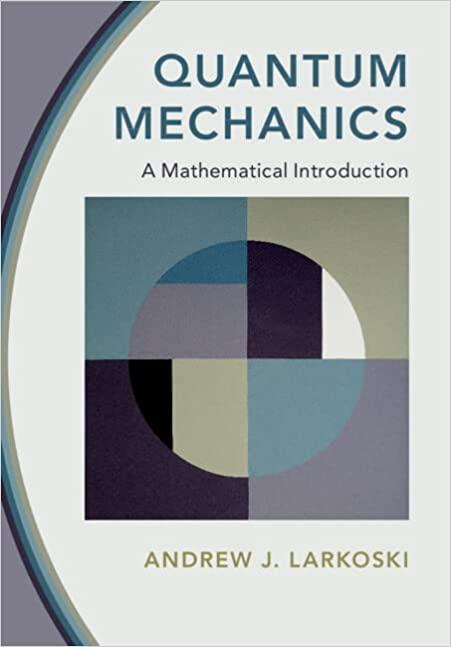In our introduction of the hydrogen atom, we assumed that the electron orbited the proton with a
Question:
In our introduction of the hydrogen atom, we assumed that the electron orbited the proton with a speed significantly smaller than the speed of light, \(c\). However, we can include the effect of a finite speed of light into the description of hydrogen and see what its effect on the ground-state energy is.
(a) The relativistic, but classical, kinetic energy of the electron can be expressed as
\[\begin{equation*}K=\sqrt{m_{e}^{2} c^{4}+|\vec{p}|^{2} c^{2}}-m_{e} c^{2} \tag{10.134}\end{equation*}\]
where \(m_{e}\) is the mass of the electron and \(\vec{p}\) is the momentum of the electron. Taylor expand this expression for the relativistic kinetic energy to quartic order in the electron's momentum; that is, up to and including terms that go like \(|\vec{p}|^{4}\). For this Taylor-expanded kinetic energy, promote it to a Hermitian operator \(\hat{K}\) on Hilbert space, and express it in position space.
(b) With this \(\hat{K}\) operator, construct the relativistically corrected Hamiltonian for the ground state of the hydrogen atom. Modify the Hamiltonian for hydrogen from Sec. 9.2, and note that it can be expressed as
\[\begin{equation*}\hat{H}=\hat{H}_{0}+\hat{H}_{\mathrm{rel}} \tag{10.135}\end{equation*}\]
where \(\hat{H}_{0}\) is the unperturbed Hamiltonian and \(\hat{H}_{\text {rel }}\) is the relativistic correction. From the ground state of the unperturbed Hamiltonian \(|\psiangle\), use the power method to estimate the relativistically corrected ground-state energy, \(E_{0, \text { rel }}\), where
\[\begin{equation*}E_{0, \text { rel }} \simeq \frac{\langle\psi|\hat{H} \hat{H} \hat{H}| \psiangle}{\langle\psi|\hat{H} \hat{H}| \psiangle} \tag{10.136}\end{equation*}\]
Remember that \(\hat{H}_{0}|\psiangle=E_{0}|\psiangle\), where \(E_{0}\) is the ground-state energy of non-relativistic hydrogen, Eq. (9.34).
(c) Now, use quantum mechanical perturbation theory to first order to estimate the ground-state energy of relativistic hydrogen. How does the perturbation theory result compare to that of the power method?
Step by Step Answer:

Quantum Mechanics A Mathematical Introduction
ISBN: 9781009100502
1st Edition
Authors: Andrew J. Larkoski





